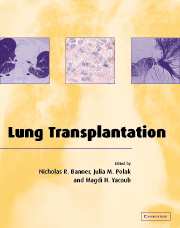Book contents
- Frontmatter
- Contents
- List of contributors
- Preface
- Part I Pulmonary disease
- Part II Lung transplantation
- 11 Overview
- 12 Patient selection and indications for lung transplantation
- 13 Single and bilateral lung transplantation
- 14 Combined heart and lung transplantation
- 15 Anaesthesia and intensive care
- 16 Medical management
- 17 Immunological mechanisms of graft injury
- 18 Pharmacological immunosuppression
- 19 Chronic lung allograft dysfunction
- 20 Infectious complications
- 21 Cytomegalovirus infection
- 22 Imaging
- 23 Transplant pathology
- 24 Haematology
- 25 Psychology
- 26 The current status of lung transplantation
- Part III Future directions
- Index
18 - Pharmacological immunosuppression
Published online by Cambridge University Press: 06 January 2010
- Frontmatter
- Contents
- List of contributors
- Preface
- Part I Pulmonary disease
- Part II Lung transplantation
- 11 Overview
- 12 Patient selection and indications for lung transplantation
- 13 Single and bilateral lung transplantation
- 14 Combined heart and lung transplantation
- 15 Anaesthesia and intensive care
- 16 Medical management
- 17 Immunological mechanisms of graft injury
- 18 Pharmacological immunosuppression
- 19 Chronic lung allograft dysfunction
- 20 Infectious complications
- 21 Cytomegalovirus infection
- 22 Imaging
- 23 Transplant pathology
- 24 Haematology
- 25 Psychology
- 26 The current status of lung transplantation
- Part III Future directions
- Index
Summary
Introduction
Pharmacological immunosuppression is required after all types of organ transplantation to prevent rejection of the allograft. Immunosuppressive drugs have a potential for serious toxicity. Due to the strength of the alloimmune response [1, 2], the drugs that are currently available cannot be used as single agents to prevent rejection without unacceptable toxicity. Current practice is therefore to use combinations of agents with complementary immunosuppressive actions but differing adverse effects to achieve synergistic immunosuppression with the lowest possible toxicity [3–5].
However, this approach does not overcome the other main problem associated with the use of these drugs, which is that their effect is not specific for the immune response to the allograft. Nonspecific immunosuppression increases the risk of both infection and certain types of malignancy in the transplant recipient [6, 7]. Although progress has been made through the introduction of potent immunosuppressive agents that affect predominantly those aspects of the immune response central to allograft rejection [8–10], the fundamental limitation of nonspecific immunosuppression remains.
The variety and complexity of clinical immunosuppression protocols has increased with the number of agents that are available and with the use of multiple-drug combinations; in addition, there are differing strategies for both the administration and the monitoring of individual drugs. The evidence base for treatment protocols in lung transplantation is limited. The number of lung transplantations that are performed in individual centres is usually too few to allow studies that can achieve a statistically robust conclusion. Many of the studies that have been published also have other methodological limitations that prevent unambiguous interpretation. Almost no large, multicentre, randomized clinical trials have been conducted in the field of lung transplantation.
- Type
- Chapter
- Information
- Lung Transplantation , pp. 205 - 242Publisher: Cambridge University PressPrint publication year: 2003
- 5
- Cited by



